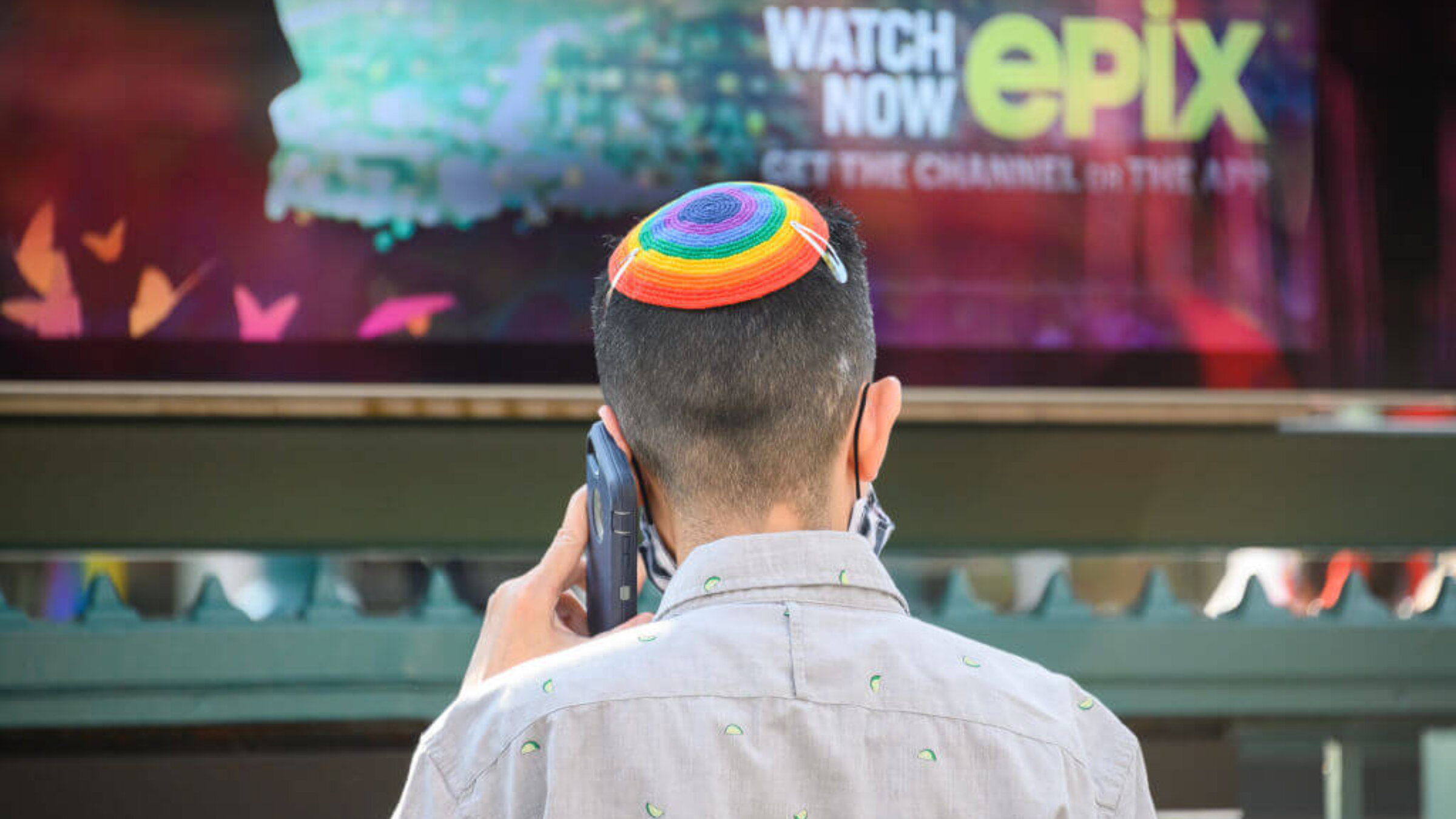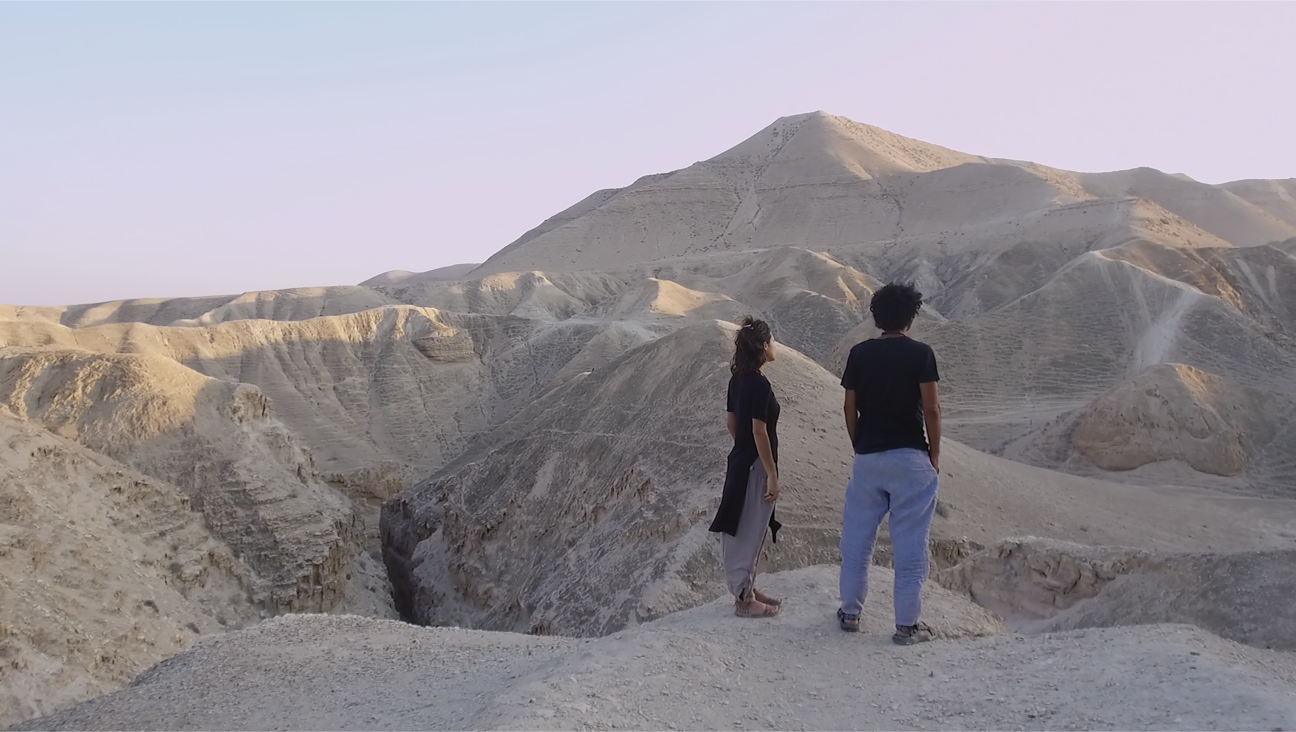Yeshiva University says it loves its LGBTQ students. Its behavior says otherwise
Y.U.’s legal actions do not align with its statements that LGBTQ students will be ‘welcomed’

A person wears a pride-themed yarmulke in the West Village on June 26, 2020 in New York City. Photo by Noam Galai/Getty Images
In an unprecedented move, Yeshiva University administrators recently suspended all student clubs rather than recognize its Y.U. Pride Alliance as a New York court had ordered.
As Yeshiva University students return to campus this week, they will be free to resume their student clubs — thanks to the Pride Alliance. Faced with the prospect of being blamed by fellow students for the shutdown, club members agreed to defer their request for official recognition until the courts have made a final decision.
I don’t blame them. But I can’t imagine how it feels to see their school punish all students rather than risk even the appearance of condoning who they are.
It takes me back to my freshman year at Stern College in 1988, a painful chapter in my own history. It was just dawning on me who I was, and that I might lose my Judaism, and my family, as a result.
Being gay meant that I would not be able to follow the life plan that had been mapped out for me: engagement by 20 to a nice Jewish boy with whom I would build a religiously observant life in a nice Orthodox community. I was alone, isolated in my pain and terrified of rejection. I had nobody to remind me that things would one day get better. It was the one and only time in my life I considered suicide.
It’s challenging to explain this to those who are able to fit the mold they are given. But when you look out over the wide expanse of your future and don’t see any path forward, it’s easy to want to disappear.
I am very lucky that God kept me from making a terrible decision during that lonely year in Stern. God has since then shown me that I am loved and accepted for who I am. But every time I hear of a young queer person taking their own life, I think, “There, but for the grace of God, go I.”
The Modern Orthodox community has come a long way since I came out. There is more nuance, more compassion, more room in the tent. Many observant people, my own family included, have learned to live in that gray zone, not quite understanding how to resolve the Torah prohibition, but knowing that acceptance of LGBTQ loved ones won’t diminish their own Yiddishkeit.
In Y.U.’s own statements, one can also see progress. “We welcome, love and care for all our students, including our LGBTQ students,” reads the Y.U. response to the Supreme Court case. “We place a specific emphasis of importance on supporting our LGBTQ students.” In my younger years, I could not have even imagined a future in which those words would be attributed to a prominent yeshiva.
But in some ways, words make the pain worse. At least back in my days at Stern, I knew where I stood. There were no LGBTQ student clubs, no out students — no pretense that my identity was acceptable. (And to be fair, there was very little LGBTQ acceptance in general in 1988.)
Because I understood these facts, I transferred to Barnard College, where I was not forced to leave either my Jewish or my LGBTQ identity at the door.
In Rabbi Ari Berman’s statement after Justice Sonia Sotomayor ruled that Y.U. could temporarily bar Y.U. Pride Alliance, the school’s president rejoiced in the ruling, but said, “Make no mistake, we will continue to strive to create an environment that welcomes all students, including those of our L.G.B.T.Q. community.”
Later, in his note regarding the school’s decision to halt all clubs, he wrote: “As our commitment to and love for our LGBTQ students are unshakeable, we continue to extend our hand in invitation to work together to create a more inclusive campus life consistent with our Torah values.”
Those are nice words. I’m sure the school’s LGBTQ students want badly to believe them. But telling students you are doing your best to welcome them while you shut down all clubs in order to exclude them is not love — it’s gaslighting.
Rejecting the Pride Alliance’s petition for official status is not supportive; it is a denial of LGBTQ personhood. It sounds kind of like this: “We welcome your tuition money, we won’t stop you from gathering and we do have some pity for you — but we do not condone who you are. In fact, you are so fundamentally unacceptable that we will halt all student groups to avoid even the appearance that who you are is OK.”
The administration can dress that up in “freedom of religion” or adhering to “faith tradition,” but the message is clear, both to LGBTQ students and to others who have disdain for the queer community.
While we’re waiting for the high court decisions, the Y.U. administrators could offer more specifics on what in the group’s stated mission of “providing a supportive space” for Y.U. students “to feel respected, visible, and represented” constitutes a violation of Torah values.
According to the Y.U. Pride Alliance Facebook page, this group is engaged in such activities as playing board games, drinking hot cocoa and delivering mishloach manot (Purim gifts). I admit I’m biased, but it’s difficult for me to see the terrible threat to the Jewish community in that behavior.
Maybe Y.U. administrators don’t fully understand the pikuach nefesh involved — the concept that the preservation of human life is more important than any other religious stricture. That suicide is the second-leading cause of death among young people ages 10 to 24, with LGBTQ youth more than four times as likely to attempt suicide than their peers? They likely are not aware that over the past year, 45% of LGBTQ youth seriously considered suicide. Perhaps they have not yet read the heartbreaking, firsthand accounts on the Y.U. Pride Alliance website, which would give these educators insight into just how unwelcome some of their LGBTQ students really feel.
As one anonymous contributor wrote: “To me, being queer at Y.U. means being the ‘other.’ It means never truly fitting in, never feeling like I can fully be myself when I’m here. It means constantly trying to remind myself that I do in fact have a promising future ahead of me, and hoping that one day others won’t feel like I do.”
Trying to live under those conditions is exhausting — mentally, physically, emotionally, spiritually. Having a safe community can make the difference for a student teetering on the edge. I pray the university will factor this risk into their future decisions, and try to remember that keeping the Pride Alliance from being officially sanctioned won’t make Jewish gay people less gay; it will only make them feel more shame, more self-loathing, more desperate to be rid of their own skin.
To contact the author, email [email protected].
A message from our Publisher & CEO Rachel Fishman Feddersen

I hope you appreciated this article. Before you go, I’d like to ask you to please support the Forward’s award-winning, nonprofit journalism during this critical time.
We’ve set a goal to raise $260,000 by December 31. That’s an ambitious goal, but one that will give us the resources we need to invest in the high quality news, opinion, analysis and cultural coverage that isn’t available anywhere else.
If you feel inspired to make an impact, now is the time to give something back. Join us as a member at your most generous level.
— Rachel Fishman Feddersen, Publisher and CEO























